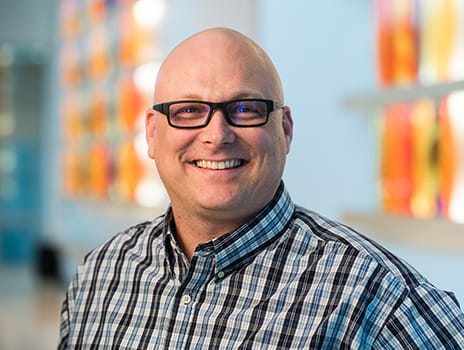Kidney Transplant Provides New Lease on Life


Darin Chance is a strong individual.
He served 8 years in the Army and Air Force, completing a tour to Iraq. He joined the Missouri National Guard, through which he supported relief efforts after a tornado swept through Joplin, Missouri, in 2011. And he is in his 16th year in law enforcement, serving the Grain Valley Police Department and Grain Valley School District.
He didn't think anything could hold him back.
But without warning, bloodwork one day showed otherwise. Though he'd experienced no symptoms, a routine physical revealed end-stage renal disease. Darin's kidneys were failing.
"It was a complete shock and surprise," he says. "I was active. I was a military leader. I was running 5Ks and 10Ks. It was sudden and extreme, and it really interrupted my lifestyle. I didn't want to accept this."
Determined to take control of the situation himself, Darin intensified his exercise regimen and modified his diet. These measures helped him stabilize his kidney function for almost 3 years. But in 2014, "the floor fell out," Darin says.
Darin's kidney function had diminished further. His glomerular filtration rate (GFR) – a value at or above 90 in a normally functioning kidney – had fallen into the 30s. From August 2014 to May 2016, Darin performed peritoneal dialysis – an at-home technique for cleansing the body of wastes when the kidneys cannot do that job – every night.
"That was definitely a lifestyle change and very draining," Darin says. "But doing it at home instead of having to go somewhere made the least impact on my life and allowed me to continue to work."
But he couldn't sustain this approach for the decades of active living still ahead of him. Darin began to explore receiving a kidney transplant.
Receiving care from the Kansas City VA Medical Center, Darin learned he would likely wait 3-5 years for the organ that would give him back his health and lifestyle.
"My nurses spoke extremely highly of The University of Kansas Health System and urged me to get on the transplant list there," Darin says. "They knew the nurses and helped me make a completely seamless transition. Within 18 months, I had my new kidney. It was such an incredible blessing."
Darin will never forget the moment he got the call.
"I was at one of my elementary schools," he says. "It was the end of the last day of school, and I was saying goodbye to the kids and high-fiving them as they met their parents. One of the other school resource officers came running over and said I had to call the police station right away. When I did, they said, 'Call your wife right now. You've got your kidney!' Then I was off to the hospital. It was really quite amazing."
Transplant surgeon Atta Nawabi, MD, performed Darin's surgery, which went very smoothly, completed in just under an hour.
"Officer Chance has served his country, serves his community and advocates for the people," Dr. Nawabi says. "The multidisciplinary approach we take at The University of Kansas Health System truly made our organization the best place he could be to receive organ transplantation. We were able to achieve excellent results with a perfectly matched new kidney. I remain very energetic about my work when I have the opportunity to see patients like Officer Chance do so well."
Darin was up and walking the day after his surgery. He was hospitalized for about a week and praised his caregivers for their skills and kindness.
"Everyone was absolutely wonderful," he says. "They did everything they could to make me feel better and accommodate me. My nurse coordinator was kind, considerate and caring and just exemplified exactly what it means to be a nurse. By the time I left, they felt like family."
Transplant coordinator Jennifer Wallace, RN, agrees.
"We definitely get to know our patients as people, and we miss them when they move on, even though it's what we want for them," she says.
Transplant nephrology nurse practitioner Tashra Thomas, NP, also supported Darin's care in the hospital.
"Officer Chance was positive from day one and brought a great attitude to his recovery process," she says. "It's not just a surgery, but a lifelong commitment to care for this new gift. We promote holistic, multidisciplinary care, addressing the medical, emotional and psychosocial aspects of organ transplant."
This is an approach Darin appreciated. He received his kidney from a healthy individual who died unexpectedly.
"I have definitely gone through feelings of guilt and remorse," Darin says. "It's very difficult to comprehend that my new lease on life is because someone else lost theirs. I am tremendously grateful to this person I didn't know, and I want to do everything I can to honor this blessing."
Darin would like to write a letter of thanks to the donor's family one day, and the care team at The University of Kansas Health System will assist him when he is ready.
Darin is now back to work, growing stronger and looking forward to his return to the pitcher's mound in his role with his traveling softball team.
"It's overwhelming to think of everything that's gone on," Darin says. "I've been so fortunate to have the support of my family, friends, community and care team. The care has been extraordinary, so far beyond my expectations. The University of Kansas Health System provides world-class care at the local level. Coming here is the best decision I ever made."
There is one other decision Darin continues to make.
"When I renew my driver's license, I absolutely check that box," he says. "I've always believed in organ donation, but now, with an extremely personal connection, I'm a bigger advocate than ever."
We offer a variety of appointment types. Learn more or call 913-588-1227 to schedule now.